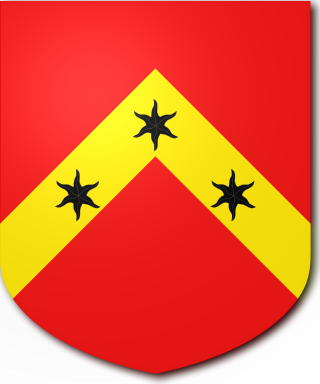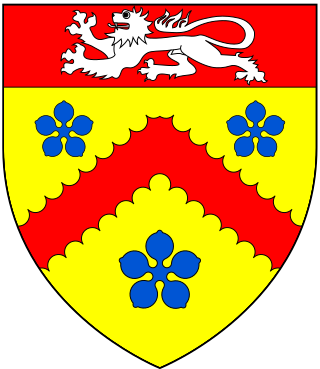Related Research Articles

There have been three baronetcies created for members of the Bacon family, all in the Baronetage of England. As of 2008, one creation is extinct and two of the creations are extant. The extant titles have been merged since 1755.
William Beauclerk, 8th Duke of St Albans was an English aristocrat.

Sir Thomas Monson, 1st Baronet was an English politician and supporter of King James I.
The Fletcher, later Aubrey-Fletcher Baronetcy, of Clea Hall in the County of Cumberland, is a title in the Baronetage of Great Britain. It was created on 20 May 1782 for Henry Fletcher, a Director of the Honourable East India Company and Member of Parliament. He was a descendant of Philip Fletcher, whose brother Sir Richard Fletcher was the father of Sir Henry Fletcher, 1st Baronet, of Hutton in le Forest. Fletcher was succeeded by his son, Henry, the second Baronet. He was High Sheriff of Cumberland from 1810 to 1811. His grandson, the fourth Baronet, was a prominent Conservative politician. In 1903 he assumed by Royal licence the additional surname of Aubrey on inheriting the Aubrey estates on the death of Charles Aubrey. Aubrey-Fletcher died childless and was succeeded by his younger brother, Lancelot, the fifth Baronet. He assumed by Royal licence the additional surname of Aubrey on succeeding to the title in 1910. His eldest surviving son, Henry, the sixth Baronet, was Lord-Lieutenant of Buckinghamshire from 1954 to 1961. He was succeeded by his son, John, the seventh Baronet. He was High Sheriff of Buckinghamshire in 1961. As of 2008 the title is held by his son, Henry, the eighth Baronet, who succeeded in 1992. He is Lord-Lieutenant of Buckinghamshire since 2006.

The Bunbury Baronetcy, of Bunbury, Oxon and Stanney Hall in the County of Chester, is a title in the Baronetage of England. It was created on 29 June 1681 for Thomas Bunbury, Sheriff of Cheshire from 1673 to 1674 and the member of an ancient Cheshire family. His grandson, Henry, the third Baronet, and great-grandson, the fourth Baronet, both sat as Members of Parliament for Chester. The latter died unmarried at an early age and was succeeded by his younger brother, the fifth Baronet. He was a clergyman. On his death in 1764 the title passed to his eldest son, the sixth Baronet. He represented Suffolk in the House of Commons for over forty years but is best remembered for his marriage to Lady Sarah Lennox. He died childless in 1821 and was succeeded by his nephew, the seventh Baronet. He was the son of Henry Bunbury, younger son of the fifth Baronet. The seventh Baronet was a distinguished soldier and politician. His eldest son, the eighth Baronet, was High Sheriff of Suffolk in 1868, and Fellow of the Royal Society. He died childless in 1886 and was succeeded by his younger brother, the ninth Baronet. He was Liberal Member of Parliament for Bury St Edmunds. He died unmarried in 1895 and was succeeded by his nephew, the tenth Baronet. He was the son of Colonel Henry William St Pierre Bunbury, third son of the seventh Baronet. He served as High Sheriff of Suffolk in 1908 and was a Deputy Lieutenant of the county. On his death in 1930 the title passed to his son, the eleventh Baronet. He was High Sheriff of Suffolk in 1936 and was a Deputy Lieutenant of the county. His son, the twelfth Baronet, was High Sheriff of Suffolk in 1972. As of 2014 the title was held by the latter's second but eldest surviving son, the thirteenth Baronet, who succeeded in 1985.
This is a list of High Sheriffs of Lincolnshire.

The Smith, later Smyth, Smijth, Bowyer-Smijth and Bowyer-Smyth Baronetcy, of Hill Hall in the County of Essex, was created on 28 November 1661 for Thomas Smith. The current holder is the fifteenth Baronet.

The Carr Baronetcy, of Sleaford in the County of Lincolnshire, is a title in the Baronetage of England. It was created on 29 June 1611 for Edward Carr who was Sheriff of Lincolnshire in 1614. The 3rd Baronet was Chancellor of the Duchy of Lancaster and a Member of Parliament for Lincolnshire in the House of Commons.

The Every Baronetcy, of Egginton in the County of Derby, is a title in the Baronetage of England. It was created on 26 May 1641 for Simon Every, Member of Parliament for Leicester in 1640 and a supporter of the Royalist cause in the Civil War. Born into the Every family of Dorset and Somerset, and a cousin to the Brice family of Somerset, he married Anne, daughter and co-heir of Sir Henry Leigh, of Egginton, Derbyshire. After his marriage, Every settled at Egginton.

The Wake Baronetcy, of Clevedon in the County of Somerset, is a title in the Baronetage of England. It was created on 5 December 1621 for Baldwin Wake. The sixth Baronet assumed the additional surname of Jones but died childless. The eighth Baronet sat as Member of Parliament for Bedford. The twelfth Baronet was High Sheriff of Northamptonshire in 1879. The thirteenth Baronet was a Major-General in the British Army. Another member of the family to gain distinction was Charles Wake, second son of the tenth Baronet; he was an Admiral in the Royal Navy.

There have been three baronetcies created for persons with the surname Cooke, two in the Baronetage of England and one in the Baronetage of Ireland. One creation is extant as of 2013.

There have been three baronetcies created for members of the Sedley family of Kent, all in the Baronetage of England. All three creations are extinct.
The Baronetcy of Goodricke of Ribston was created in the Baronetage of England by King Charles I on 14 August 1641 for his loyal supporter John Goodricke of Ribston, Yorkshire. He represented Yorkshire in the Cavalier Parliament from 1661 to his death.
There have been two Wray Baronetcies, both created in the Baronetage of England. The first was created on 25 November 1611 for William Wray of Glentworth, Lincolnshire, and became extinct upon the death of the 15th Baronet in 1809. The second was created on 27 June 1660 for William Wray of Ashby, Lincolnshire. He was the grandson of the 1st Baronet of Glentworth, and his son, Christopher Wray, inherited the 1660 baronetcy in 1669 and the 1611 baronetcy, as the 6th Baronet, in 1672. The 1660 creation became extinct upon the death of Sir William Wray, 7th Baronet of Glentworth and 2nd Baronet of Ashby, in about 1687.
The High Sheriff of Queen's County was the British Crown's judicial representative in Queen's County, Ireland, Ireland from the 16th century until 1922, when the office was abolished in the new Free State and replaced by the office of Offaly County Sheriff. The sheriff had judicial, electoral, ceremonial and administrative functions and executed High Court Writs. In 1908, an Order in Council made the Lord-Lieutenant the Sovereign's prime representative in a county and reduced the High Sheriff's precedence. However, the sheriff retained his responsibilities for the preservation of law and order in the county. The usual procedure for appointing the sheriff from 1660 onwards was that three persons were nominated at the beginning of each year from the county and the Lord Lieutenant then appointed his choice as High Sheriff for the remainder of the year. Often the other nominees were appointed as under-sheriffs. Sometimes a sheriff did not fulfil his entire term through death or other event and another sheriff was then appointed for the remainder of the year. The dates given hereunder are the dates of appointment. All addresses are in Queen's County unless stated otherwise.
The Sheriff of County Dublin was the Sovereign's judicial representative in County Dublin. Initially, an office for a lifetime, assigned by the Sovereign, the Sheriff became an annual appointment following the Provisions of Oxford in 1258. The first recorded Sheriff was Ralph Eure, appointed in that year. The next recorded Sheriff was Sir David de Offington, who was Sheriff in 1282. Besides his judicial importance, the sheriff had ceremonial and administrative functions and executed High Court Writs.
There have been two baronetcies created people named Bolles, one in the Baronetage of England and one in the Baronetage of Nova Scotia.
The Castleton Baronetcy, of St Edmundsbury in the County of Suffolk, was a title in the Baronetage of England. It was created on 9 August 1641 for William Castleton, High Sheriff of Suffolk from 1641 to 1642. The second Baronet was High Sheriff of Suffolk from 1660 to 1661. The sixth Baronet was Rector of Gillingham, Norfolk. The eleventh Baronet was Rector of Thornham, Norfolk. The title became extinct on the death of the twelfth Baronet in 1810.
There have been two baronetcies created for members of the Hussey family, both in the Baronetage of England. Both creations are extinct.

Sir William Earle Welby, 1st Baronet, was a British land-owner, baronet and Member of Parliament for Grantham from 1802 to 1806. He also served as High Sheriff of Lincolnshire from 1796 to 1797.